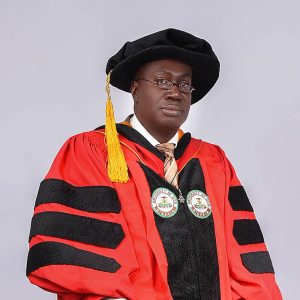The Directorate of Research and Development (R&D) by its nomenclature oversees the research output of the University by way of laying the framework for productive research engagements with a view to animating the triple Helix and Quadruple Helix models. The dynamic nature of research entails active and sustained engagements and these all fall within the purview of the R&D role prescription. For ease in comprehensibility, a breakdown of these functionalization using a descriptive approach is here made below:
- Research Policy conceptualization and formulation
Research becomes a spurious activity in the absence of a policy framework. In this light the R&D Directorate, working through its statutory Committees, formulates policies on research so as to mainstream consciousness on guided research while laying the tracks for ethical parameters.
The policy framework also outlines the pathways for ethical approvals and collaborations.
- Enhanced Funding and Grantsmanship
The Directorate also is positioned to increase the revenue base of the University by way of research commercialization. This is by way of urgently bringing to fore the core mandate of Universities. Borrowing a leaf from best practices, research is a pivotal source of funding for Universities. The Directorate is leveraging on this vision by way of its operational matrix.
A second tilt is on grantsmanship. The Directorate of Research and Development has been on the driver’s seat of this machinery by way of maintaining a harmonious interface with funding agencies both within and outside the shores of Nigeria. Ongoing collaborations with TETFUND, NDDC, NCDMB; etc abound.
iii. Enhanced Visibility and University Ranking through Research
By mainstreaming consciousness on research beyond promotion, the Directorate serves to build a framework through which individual and collaborative output properly channeled will attract global visibility and by so doing enhance the ranking of the University. The Directorate lays the track for research output within a given timeline with a cascading effect on the University community through Faculties and Departments.
- Capacity Building on Contemporary Research Dynamics and Mechanics
The Directorate periodically facilitates capacity building through workshops, webinars, and colloquiums on contemporary practices in research, end note management, research fairs, etc. Through these programmes, awareness is created, interest generated, and determination instilled. By so doing, potentials are optimized with self-actualization taking second index.
- Oversight on Research Centres, Units, and Groups
The Directorate also exercises oversight on research centres and other allied research units and groups especially in the Faculties. The Directorate follows a two-step approach by gravitating efforts towards areas of research interests while galvanizing quality assurance embellishments.
- Overall Collaboration with Cognate Directorates and Units
Since ours is an organic entity, the Directorate of R & D cannot be a stand alone. To this end, the Directorate works in collaboration with the Patent Unit, Advancement and Linkages, as well as the Postgraduate School to channel research output through harmonized forms for enhanced benefits and visibility.
vii. General Co-ordination
The Directorate directly and remotely co-ordinates research propulsions in the University by way of processing submissions for TETFund interventions as well as those for NDDC, NCDMB, and lots more. As an icing, the Directorate also oversees the issuance of ethical approvals and numbers.

